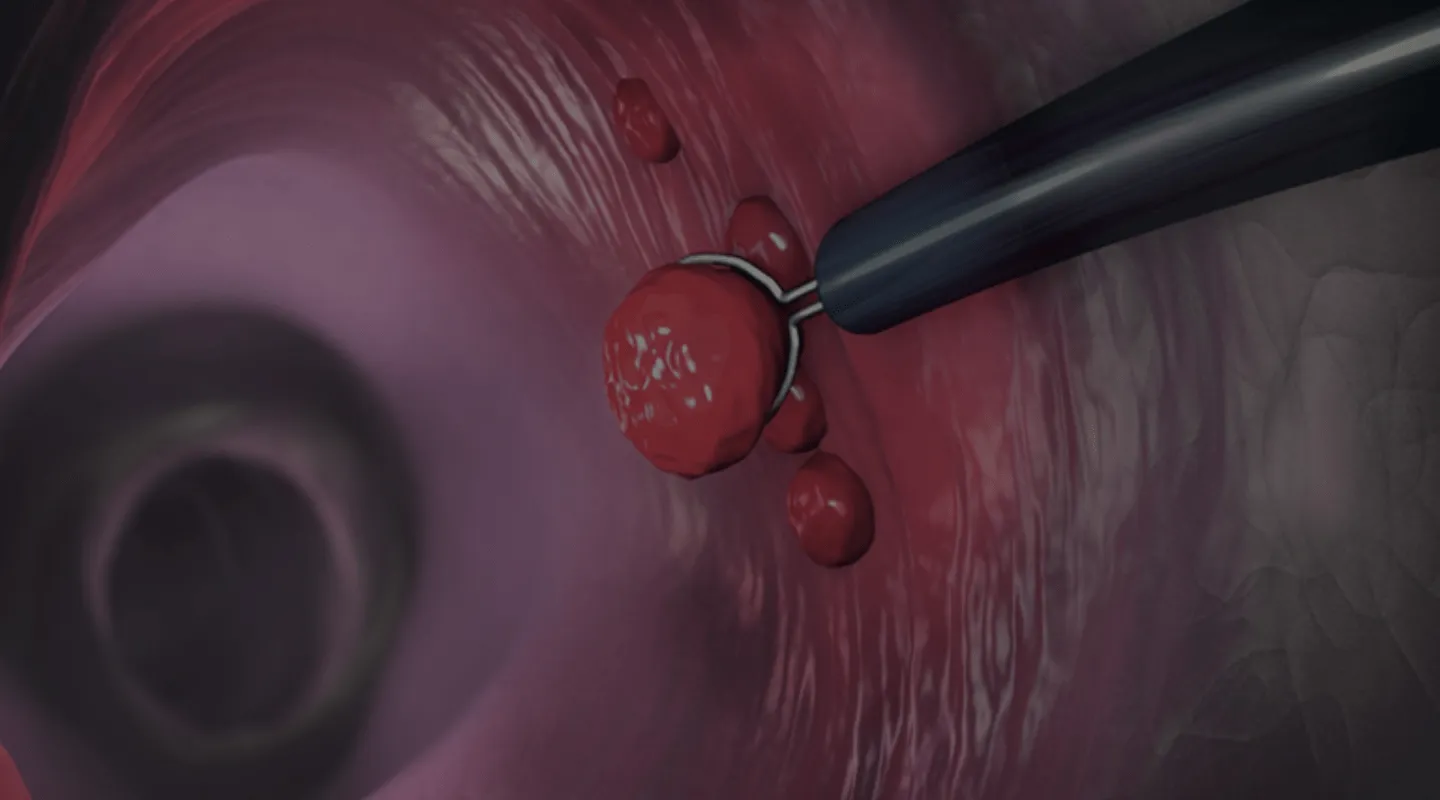
Polyp Surgery
Your Affordable Polyp Surgery in Tunisia
Our specialists use techniques adapted to each type of polyp for a quick and lasting recovery.
How does it work?
Polyp Surgery in Tunisia
Polyp surgery in Tunisia is an operation that involves removing polyps located in the colon and rectum. In most cases, intestinal polyps are benign tumors, but some types of polyps can develop into colon cancer, hence the importance of treatment and removal of detected polyps. Here’s everything you need to know about polyp treatment in Tunisia: indications, the procedure, and postoperative care.
What is Polyp Surgery in Tunisia?
In some patients, colorectal polyps, which are benign tumors that develop on the intestinal wall, particularly on the mucous membrane of the colon or rectum, can be diagnosed. Following diagnosis, surgery must be performed to prevent the development of colon cancer. Polyps develop most often in individuals over 50, and to prevent colon cancer, it is strongly recommended to have a colonoscopy screening starting at this age. In addition to age, other risk factors are hereditary: if other family members have had this pathology, then the patient is at greater risk of developing it in turn. It should also be noted that diet plays a role in the transformation of a polyp into cancer: overcooked meats, high consumption of animal fat, and low consumption of vegetable fiber will increase the risk of cancer development. Most often, polyps do not cause any particular symptoms, and in many patients, they are discovered during a colonoscopy; however, certain signs may indicate the presence of polyps, including blood in the stool, sensations of discomfort or pain in the rectum, or the presence of mucus in the stool.
Polyp Surgery: What You Need to Know Before the Procedure
Before a polyp surgery operation, and as with any other surgical operation, it is necessary to prepare well and follow certain steps before the operation. You will need to put together a complete medical file, including a health check-up and blood tests. A colonoscopy is one of the essential medical examinations before polyp surgery: during this examination, a tube equipped with a mini-camera will be inserted through the anus, which will allow the inside of the intestine to be seen in real time on a screen; this procedure will identify and locate the polyps, and thus establish a precise diagnosis. Your surgeon will give you the list of medical examinations to be done, and after the diagnosis, will give you details of the preparations to be carried out and the surgical procedure that will be performed to treat the polyps. A meeting with the anesthesiologist will also be scheduled.
Price of Polyp Surgery in Tunisia
By choosing to have polyp surgery in Tunisia, you benefit from very affordable prices while taking advantage of the expertise of our doctors. Feel free to request a quote from Tunisia Destination Santé.
Your health, our priority.
Request your free quote.
What are the different types of colon and rectal polyps?
Polyps are distinguished by their size, appearance, location in the digestive tract, etc. Thus, there are different types of polyps, some of which may develop into cancer:
- Adenomatous polyps: The adenomatous polyp is one of the types of polyps that can develop into colon cancer. There are different types of adenomatous polyps, such as tubular adenoma or villous adenoma. This type of polyp is the most diagnosed; in the majority of patients suffering from polyps (between 60% and 70%), an adenomatous polyp will be diagnosed;
- Hyperplastic polyps: The hyperplastic polyp is characterized as a non-cancerous colorectal tumor. This type of polyp is very common, usually small, and located in the rectum. Hyperplastic polyps can be diagnosed in patients suffering from inflammatory bowel disease;
- Hamartomatous polyps: These are less commonly diagnosed but can appear in any part of the digestive tract (although they most often develop in the small intestine). As with other types of polyps, hamartomatous polyps can cause various complications, including intestinal obstruction or digestive hemorrhage;
Polyp Surgery: What You Need to Know Before the Procedure
Before a polyp surgery operation, and as with any other surgical operation, it is necessary to prepare well and follow certain steps before the operation. You will need to put together a complete medical file, including a health check-up and blood tests. A colonoscopy is one of the essential medical examinations before polyp surgery: during this examination, a tube equipped with a mini-camera will be inserted through the anus, which will allow the inside of the intestine to be seen in real time on a screen; this procedure will identify and locate the polyps, and thus establish a precise diagnosis. Your surgeon will give you the list of medical examinations to be done, and after the diagnosis, will give you details of the preparations to be carried out and the surgical procedure that will be performed to treat the polyps. A meeting with the anesthesiologist will also be scheduled.
Our advantages


The Procedure
If the polyps are not too numerous and are small (for benign polyps), it will be possible to remove them using a colonoscopy: the gastroenterologist will reach and remove the identified polyps one by one, using his surgical instruments. This operation is performed under general anesthesia. If the diagnosis shows the presence of larger polyps that cannot be removed by colonoscopy, then the surgeon will remove the polyps either by opening the colon, or by operating through the anus, and a rectoscope will then be used to insert the surgical instruments. In the most severe cases, for polyps that are in a particular location, it will be necessary to remove part of the colon or rectum.
Postoperative Care and Follow-up
It should be noted that the risk of recurrence of this pathology is quite significant, and if the patient has developed intestinal polyps in the past, then they risk suffering from them again in the coming years. This is why it is very important to benefit from regular monitoring after the first case.
—
Frequently Asked Questions
Robotic surgery offers greater precision, improved three-dimensional vision, and better dexterity, which can reduce tissue trauma, decrease postoperative pain, and accelerate recovery compared to traditional laparoscopic surgery.
Yes, the TEM (Transanal Endoscopic Microsurgery) technique allows for the precise excision of rectal polyps near the anal sphincter, thus preserving sphincter function and minimizing the risk of incontinence.
Artificial intelligence helps identify polyps that are difficult to detect during colonoscopy, guides surgeons in real time during the procedure, and predicts potential complications, thereby improving patient outcomes and safety.
Criteria include the size of the polyp, its location, its histological appearance, suspicion of malignancy, and response to previous endoscopic treatments. Large, malignant, or recalcitrant polyps often require surgical intervention.
Genetic evaluation can identify hereditary syndromes such as familial adenomatous polyposis or Lynch syndrome, which influences the treatment plan, postoperative surveillance, and recommendations for family members.
In patients with inflammatory bowel disease, meticulous evaluation of surrounding tissues is necessary to minimize the risk of perforation and infectious complications. Less invasive surgical techniques and inflammation management strategies are often employed.
Surveillance colonoscopy is essential for early detection of any recurrence or appearance of new polyps, monitoring resection sites, and assessing the overall health of the colon, generally recommended at intervals of 3 to 5 years after surgery.
The gut microbiota plays a role in the development and progression of polyps. Dysbiosis can promote polyp growth. Modulation of the microbiota before and after surgery can improve outcomes and reduce the risk of recurrence.
Impacts may include changes in bowel habits, increased sensitivity, temporary diarrhea or constipation. However, most patients regain normal bowel function after the initial recovery period.
Complete resection of adenomatous polyps significantly reduces the risk of malignant transformation into colorectal cancer. Regular surveillance and postoperative screening are crucial to quickly detect and treat any new polyps or signs of malignancy.
